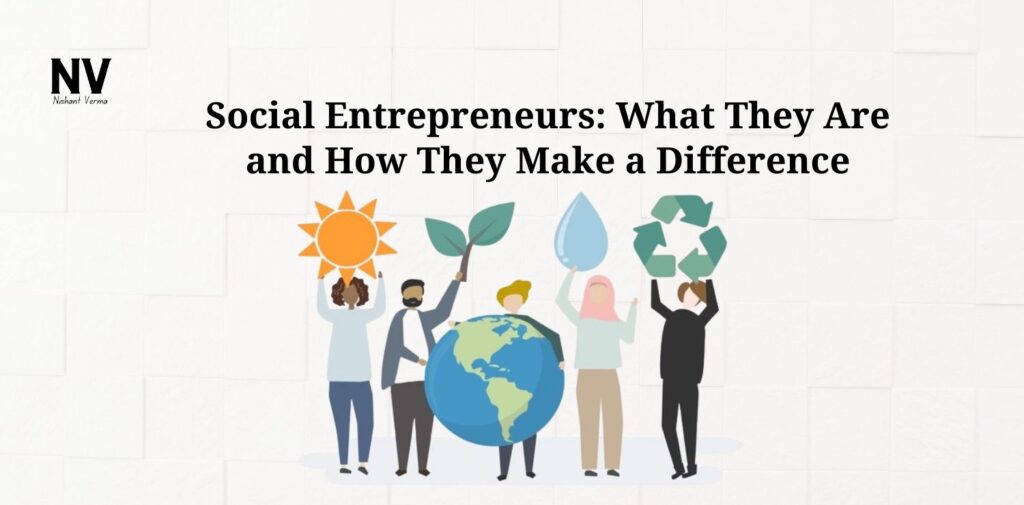Social entrepreneurs are a unique breed of individuals who want to make the world a better place. They combine the innovation and determination of entrepreneurs with a deep commitment to solving social problems. In this article, we will explore what entrepreneurs are, how they work, and provide examples to illustrate their impact.
What is a Social Entrepreneur?
A social entrepreneur is someone who starts a business or organization with the primary goal of addressing a social or environmental issue. Unlike traditional entrepreneurs, who focus mainly on making profits, entrepreneurs aim to create positive changes in society. They are driven by a sense of responsibility and a desire to improve the lives of others.
Key Characteristics of Social Entrepreneurs
To better understand entrepreneurs, let’s delve into some of their key characteristics:
- Social Mission: entrepreneurs are defined by their commitment to a specific social or environmental mission. Their primary motivation is to make a positive impact on society rather than maximizing profits.
- Innovative Solutions: They are creative problem solvers who seek innovative ways to address complex issues. Entrepreneurs think outside the box to find sustainable solutions to the problems they care about.
- Sustainability: entrepreneurs aim to create long-term, sustainable change. Their initiatives are designed to have a lasting impact, not just provide temporary relief.
- Empowerment: They often work to empower marginalized or underserved communities, giving people the tools and resources they need to improve their own lives.
- Adaptability: Entrepreneurs are adaptable and resilient. They are willing to pivot and change their approach when necessary to achieve their goals.
How Do Social Entrepreneurs Work?
Entrepreneurs use a combination of business principles and social innovation to achieve their objectives. Here’s how they typically operate:
- Identifying a Social Problem
The first step for a social entrepreneur is to identify a social or environmental issue that needs addressing. This can range from poverty and education gaps to environmental sustainability and healthcare access. - Creating a Solution
Once the problem is identified, social entrepreneurs develop innovative solutions. These solutions can take many forms, such as a new product, service, or business model. - Building a Business or Organization
To implement their solutions, entrepreneurs create a business or organization. This entity can be for-profit, non-profit, or a hybrid model that combines both approaches. - Mobilizing Resources
Social entrepreneurs gather the necessary resources to support their mission. This may include funding, partnerships, and a team of dedicated individuals who share their vision. - Measuring Impact
Measuring impact is crucial for entrepreneurs. They use metrics and data to track the progress and effectiveness of their initiatives. - Scaling Up
Successful entrepreneurs often aim to scale up their solutions to reach a broader audience and have a more significant impact.
Examples of Social Entrepreneurs and Their Initiatives
Now that we have a good understanding of what entrepreneurs are and how they operate, let’s look at some real-world examples to see their work in action.
Muhammad Yunus – Grameen Bank
- Social Entrepreneur: Muhammad Yunus
- Initiative: Grameen Bank
Muhammad Yunus is a pioneer in the field of microfinance. He founded the Grameen Bank in Bangladesh, which provides small loans to impoverished individuals, particularly women, to help them start their businesses. These loans have empowered countless people to lift themselves out of poverty and build better lives for their families.

Blake Mycoskie – TOMS
- Social Entrepreneur: Blake Mycoskie
- Initiative: TOMS
Blake Mycoskie started TOMS, a popular shoe company with a unique business model. For every pair of shoes sold, TOMS donates a pair to a child in need. This “One for One” approach has provided millions of children around the world with shoes, preventing diseases and improving their quality of life.

Wendy Kopp – Teach For America
- Social Entrepreneur: Wendy Kopp
- Initiative: Teach For America
Wendy Kopp founded Teach For America, an organization that recruits and trains college graduates to teach in underserved communities across the United States. The program aims to bridge educational inequalities and provide children with access to quality education, regardless of their background.

Bill Drayton – Ashoka
- Social Entrepreneur: Bill Drayton
- Initiative: Ashoka
Bill Drayton is the founder of Ashoka, a global organization that identifies and supports social entrepreneurs worldwide. Ashoka provides these changemakers with resources, networks, and opportunities to scale up their initiatives and drive positive social change on a global scale.

Bunker Roy – Barefoot College
- Social Entrepreneur: Bunker Roy
- Initiative: Barefoot College
Bunker Roy established Barefoot College in India, a place where rural and often illiterate women are trained in various skills, such as solar engineering and healthcare. These women then return to their villages as trained solar engineers, bringing renewable energy and medical services to their communities.

Challenges and Rewards of Social Entrepreneurship Companies
While social entrepreneurship companies are incredibly rewarding, it also comes with its fair share of challenges. Let’s explore these challenges and the potential rewards that keep entrepreneurs motivated
Challenges:
Financial Struggles: Social entrepreneurs often face financial challenges, especially during the initial stages of their initiatives. Funding sources may be limited, and securing investment for a social cause can be more challenging than for-profit ventures.
Balancing Social and Financial Goals: Balancing social and financial objectives can be a constant struggle. A social entrepreneur must generate enough income to sustain their initiatives while remaining true to their mission.
Resistance to Change: Social innovation can face resistance from traditional institutions and systems. Changing deeply ingrained practices and policies can be an uphill battle.
Impact Measurement: Measuring the impact of social initiatives can be complex. Quantifying the positive change brought about by a social entrepreneur’s work is essential but challenging.
Burnout: The passion that drives social entrepreneurs can sometimes lead to burnout. The constant challenges and emotional investment in their work can take a toll on their well-being.
Rewards
- Positive Social Impact: The most significant reward for social entrepreneurs is the positive impact they have on society. They get to witness real, tangible changes in the lives of individuals and communities they aim to help.
- Fulfilment and Purpose: entrepreneur finds fulfilment and purpose in their work. They wake up every day knowing they are making a difference and contributing to a better world.
- Innovation and Creativity: Entrepreneurs have the freedom to think creatively and innovate. They come up with new solutions to old problems, pushing the boundaries of what’s possible.
- Building a Community: Social entrepreneurs often build strong communities of like-minded individuals who share their vision. This support network can be a source of inspiration and collaboration.
- Recognition and Influence: Successful person can gain recognition and influence, which can help them drive more significant change and secure more resources for their initiatives.
How to Become a Social Entrepreneur
Becoming a social entrepreneur is an admirable endeavour, but it requires careful planning and dedication. Here are some steps to help you get started:
- Identify Your Passion: Start by identifying the social or environmental issue you are most passionate about. What cause motivates you? Your commitment will be the driving force behind your efforts.
- Research and Learn: Take the time to research the issue thoroughly. Understand its root causes, existing solutions, and the communities affected. Learning as much as possible will help you develop effective solutions.
- Develop an Innovative Solution: Think creatively and develop an innovative solution to the problem. This solution should be practical, sustainable, and have a clear pathway to implementation.
- Create a Business Model: Determine the structure of your organization. Will it be a non-profit, for-profit, or a hybrid model? Define your revenue model and how you’ll fund your initiative.
- Build a Team: Surround yourself with like-minded individuals who share your passion and bring complementary skills to the table. A strong team is essential for success.
- Secure Funding: Identify potential sources of funding for your initiative. This can include grants, investors, crowdfunding, or partnerships with organizations that align with your mission.
- Measure Impact: Develop a system to measure and track the impact of your initiative. Data and metrics are essential for demonstrating the effectiveness of your work.
- Start Small and Scale: Begin with a pilot project or a small-scale initiative to test your solution. Once you prove its effectiveness, work on scaling it up to reach a broader audience.
- Stay Committed: Social entrepreneurship is a long-term commitment. There will be challenges and setbacks, but your unwavering commitment to your mission will drive your success.
Conclusion
Social entrepreneurs are individuals who combine their entrepreneurial spirit with a deep commitment to making the world a better place. They identify pressing social and environmental issues, develop innovative solutions, and create organizations to bring about lasting change. While they face challenges along the way, the rewards of positive social impact, fulfilment, and innovation keep them motivated.
If you are inspired to become a social entrepreneur, remember that your journey starts with identifying your passion, learning about the issue, and developing innovative solutions. With dedication, a strong team, and a commitment to measuring impact, you can join the ranks of those making a meaningful difference in the world.
So, whether you’re looking to start a business, launch a non-profit, or simply support entrepreneurs, you now have a better understanding of what it takes to make a positive change in society. entrepreneurs are the driving force behind many impactful initiatives, and their work continues to shape a better future for all.




